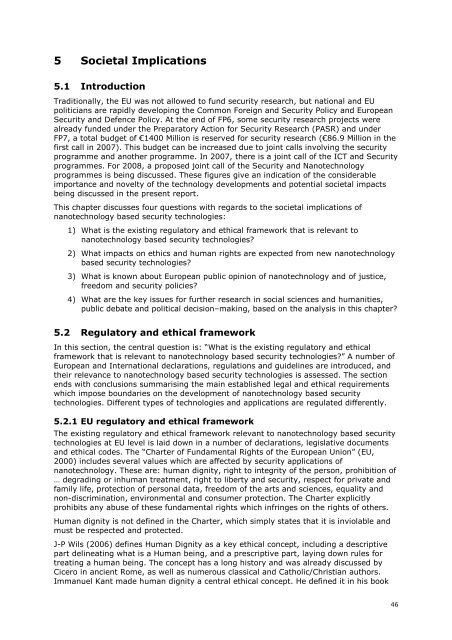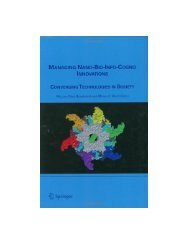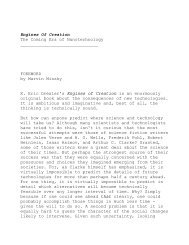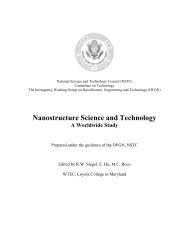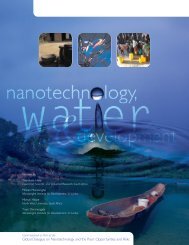Download - Nanowerk
Download - Nanowerk
Download - Nanowerk
You also want an ePaper? Increase the reach of your titles
YUMPU automatically turns print PDFs into web optimized ePapers that Google loves.
5 Societal Implications<br />
5.1 Introduction<br />
Traditionally, the EU was not allowed to fund security research, but national and EU<br />
politicians are rapidly developing the Common Foreign and Security Policy and European<br />
Security and Defence Policy. At the end of FP6, some security research projects were<br />
already funded under the Preparatory Action for Security Research (PASR) and under<br />
FP7, a total budget of €1400 Million is reserved for security research (€86.9 Million in the<br />
first call in 2007). This budget can be increased due to joint calls involving the security<br />
programme and another programme. In 2007, there is a joint call of the ICT and Security<br />
programmes. For 2008, a proposed joint call of the Security and Nanotechnology<br />
programmes is being discussed. These figures give an indication of the considerable<br />
importance and novelty of the technology developments and potential societal impacts<br />
being discussed in the present report.<br />
This chapter discusses four questions with regards to the societal implications of<br />
nanotechnology based security technologies:<br />
1) What is the existing regulatory and ethical framework that is relevant to<br />
nanotechnology based security technologies?<br />
2) What impacts on ethics and human rights are expected from new nanotechnology<br />
based security technologies?<br />
3) What is known about European public opinion of nanotechnology and of justice,<br />
freedom and security policies?<br />
4) What are the key issues for further research in social sciences and humanities,<br />
public debate and political decision–making, based on the analysis in this chapter?<br />
5.2 Regulatory and ethical framework<br />
In this section, the central question is: “What is the existing regulatory and ethical<br />
framework that is relevant to nanotechnology based security technologies?” A number of<br />
European and International declarations, regulations and guidelines are introduced, and<br />
their relevance to nanotechnology based security technologies is assessed. The section<br />
ends with conclusions summarising the main established legal and ethical requirements<br />
which impose boundaries on the development of nanotechnology based security<br />
technologies. Different types of technologies and applications are regulated differently.<br />
5.2.1 EU regulatory and ethical framework<br />
The existing regulatory and ethical framework relevant to nanotechnology based security<br />
technologies at EU level is laid down in a number of declarations, legislative documents<br />
and ethical codes. The “Charter of Fundamental Rights of the European Union” (EU,<br />
2000) includes several values which are affected by security applications of<br />
nanotechnology. These are: human dignity, right to integrity of the person, prohibition of<br />
… degrading or inhuman treatment, right to liberty and security, respect for private and<br />
family life, protection of personal data, freedom of the arts and sciences, equality and<br />
non-discrimination, environmental and consumer protection. The Charter explicitly<br />
prohibits any abuse of these fundamental rights which infringes on the rights of others.<br />
Human dignity is not defined in the Charter, which simply states that it is inviolable and<br />
must be respected and protected.<br />
J-P Wils (2006) defines Human Dignity as a key ethical concept, including a descriptive<br />
part delineating what is a Human being, and a prescriptive part, laying down rules for<br />
treating a human being. The concept has a long history and was already discussed by<br />
Cicero in ancient Rome, as well as numerous classical and Catholic/Christian authors.<br />
Immanuel Kant made human dignity a central ethical concept. He defined it in his book<br />
46


